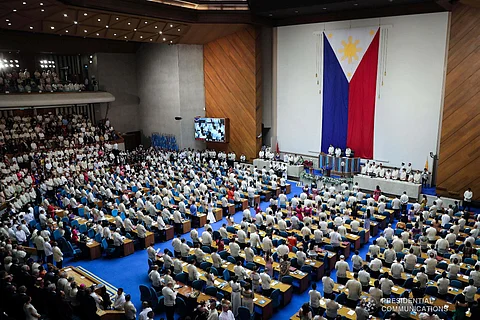
- NEWS
- the EDIT
- COMMENTARY
- BUSINESS
- LIFE
- SHOW
- ACTION
- GLOBAL GOALS
- SNAPS
- DYARYO TIRADA
- MORE

Lawmakers who will compose the 20th Congress are being urged by the Federation of Philippine Industries (FPI) to enact laws that will strengthen domestic manufacturing, reinforce fair trade practices, and drive the Philippines’ reindustrialization.
In a statement on Sunday, the FPI, headed by Beth Lee, released its legislative agenda for the 20th Congress. The group emphasized the full implementation of key laws such as the Tatak Pinoy Act and CREATE MORE, along with complementary measures to protect local producers, stimulate innovation, and ensure a competitive investment environment.
“Implement the Tatak Pinoy Act effectively, with proper funding and the establishment of a multi-sectoral Tatak Pinoy Council to guide and monitor industrial development,” the FPI said.
Other priority policy reforms include accelerating the rollout of CREATE MORE to ensure timely and fair access to incentives for both domestic and export-oriented manufacturers; enforcing full compliance with Philippine National Standards (PNS) across all ports of entry and markets to ensure product safety and quality; advancing a green industrial policy promoting low-carbon manufacturing, clean technology production, and access to transition financing; and implementing the Local Preference Procurement Law, which mandates government procurement of locally manufactured, PNS-compliant products—especially in infrastructure, construction materials, and essential public goods.
On trade and enforcement, the FPI urged lawmakers to pass a Comprehensive Anti-Smuggling Law that includes the creation of a Public-Private Task Force reporting to the President, port digitization, and enhanced customs profiling tools.
“Strengthen trade remedy mechanisms, allowing for faster and more effective implementation of safeguard, anti-dumping, and countervailing duties, including the use of provisional measures during investigations. Adopt a balanced and strategic tariff policy, including periodic reviews and pre-liberalization impact assessments for sensitive sectors,” the group urged.
The FPI also called for the institutionalization of a Trade and Industry Defense System to provide real-time monitoring and response to import surges and unfair foreign competition. It also proposed the creation of an Independent Investment Ombudsman tasked with resolving unjustified delays, harassment, and regulatory inconsistencies encountered by investors, while coordinating with agencies such as the Department of Trade and Industry (DTI), the Fiscal Incentives Review Board (FIRB), the Board of Investments (BOI), the Department of Finance (DOF), and local government units.
Moreover, the FPI is pushing for e-governance reforms, including full digital integration of trade facilitation, permitting, and regulatory processes across agencies to eliminate red tape, improve transparency, and deter corruption.
Founded in 1991, FPI is the country’s leading umbrella organization of legitimate manufacturers and producers. Representing key sectors of the economy, it advocates for fair competition, sound industrial policy, and a resilient manufacturing base to support national development.
The Philippine Chamber of Commerce and Industry (PCCI), the country’s largest business organization, last week called on President Ferdinand Marcos Jr. to endorse 20 critical legislative measures in his upcoming State of the Nation Address (SONA) and push for their inclusion in the 20th Congress' agenda.
Key measures include the Open Access in Data Transmission Bill (Konektadong Pinoy Act), the National Comprehensive Infrastructure Masterplan, the International Maritime Competitiveness Act, and amendments to the Philippine Ports Authority (PPA) Act and the Civil Aviation Authority of the Philippines (CAAP) Charter. Other proposals include amendments to the Magna Carta for MSMEs, the Blue Economy Act, Corporate Farming Act, amendments to the Agri-Agra Law, ASIN Law, Warehouse Receipts Act, and the long-awaited National Land Use and Management Act.
Also on the list are the Apprenticeship Training System Act and amendments to the Dual Training System Act, the Budget Modernization and Reform Act, the Customs Amnesty Act, the Cybersecurity Act, the E-Governance Act, and the Artificial Intelligence Act.
“These measures address structural bottlenecks that hinder investment, logistics, rural development, and regulatory efficiency. We believe President Marcos’ strong endorsement of these bills during his SONA will help fast-track their passage and demonstrate the administration’s commitment to inclusive and future-ready economic growth,” said PCCI president Enunina Mangio.
